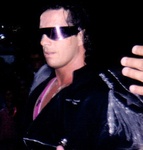In one of his lectures, Jordan Peterson was asked a question about whether morality was merely a matter of who was more powerful. He replied by telling the story of Bret “The Hitman” Heart and recommenda documentary to watch that he thought was one of the best he’s seen: Hitman Hart: Wrestling with Shadows.
The documentary follows the career of Bret Hart, a Canadian wrestler who was brought up to become a wrestler by his father, Stu Hart. In the early days of the WWF, Stu Hart made a name for himself as a great wrestler but during Bret Hart’s career, the WWF managed to reach a much larger and more global audience, and his fame surpassed that of his father.
Wrestling is categorized as “Sports Entertainment” – and it is often a theatrical representation of the fight between good and evil. But it is also quite simplistic – the good guys were always good, and the bad guys were always bad – they were called heels. The fans chose which was which and made their favorite character clear when they supported Bret Hart for 14 years. He was the best good guy. What the fans always wanted, above everything else, was good entertainment. They wanted to be able to cheer for the guy they liked and boo the guy they hated without incurring any negative consequences. Wrestling isn’t as sophisticated as a great novel, but it represents moral drama that anyone can relate to. Peterson mentions that roughly 15 percent of the population can’t follow simple written instructions, a lot of people don’t watch movies because the plots are too difficult to follow, and barely anyone reads novels with highly complex narratives and language. Wrestling wasn’t going to lead to profound existential or ontological realizations, but it was a highly accessible drama that did not have many rivals.

Bret Hart was idolized in both the U.S and Canada and later the rest of the world, but one day, unfortunately for Bret Hart, Stone Cold managed to make “bad” cool. Instead of booing the most evil wrestler of the WWF, the fans loved him. They applauded him when he behaved “immorally” and Vince McMann took notice of that.
Being the good guy was out of fashion Later, Vince McMann explained on television that he was no longer going to patronize his audience; the fight between good and evil would not be so obvious. The character that impelled his fans to “take their vitamins” wasn’t cool, it was boring. A moral relativism emerged and suddenly the heels were the heroes. Following the advice of McMann, Bret Hart changed his persona to accommodate this change and became a heel himself – albeit reluctantly. But while doing so, he antagonized his fans in the U.S by insulting him during the show. He was finally replaced by Shawn Michaels as the leading heel. After his last fight, he rebelled against Vince McMann, the founder of the WWF. Bret punched him in the face.
Bret Hart full identified with the good guy character and believed that wrestling was more than just entertainment, he believed that he was standing up for what was right and felt that he was being unfairly betrayed by the WWF. He thought that Vince McMann sabotaged his career.
The answer to the girl’s question in class? What’s considered right and wrong depends. To Bret Hart, it’s not only about strength, but also about being a good person and having family values. To Vince McMann, it was about whatever was getting the ratings up and bringing the dollars in. To the fans of the WWF, it was about whoever gave them the most viewing pleasure and kept them excited. If we look at history, we see that different cultures had different ideas about what they thought was right or wrong – the Egyptians, for example, believed that vision and true speech were the highest on the values hierarchy.
Bret Hart represented the archetype of the hero, the good guy who spoke the truth, was loyal, and played by the rules. Eventually, the fans got sick of seeing the same thing. They wanted something new, something different. And what I notice when thinking about these stories, is that the only constant in our ideas about morality is not that they are different or conflicting, but that they are constantly changing. In that there is no finite set of moral positions that have always been taken, but that new moral systems are always emerging.
Perhaps it is because the human organism demands it, people have a proclivity to experiment, evolve, and explore new experiences. The WWF fans that applauded Stone Cold for raising his middle finger to them didn’t do so because they morally conceptualized his actions as good, but because they wanted something new. (My summary of the Crumb Documentary that Peterson Recommends in another lecture.)
